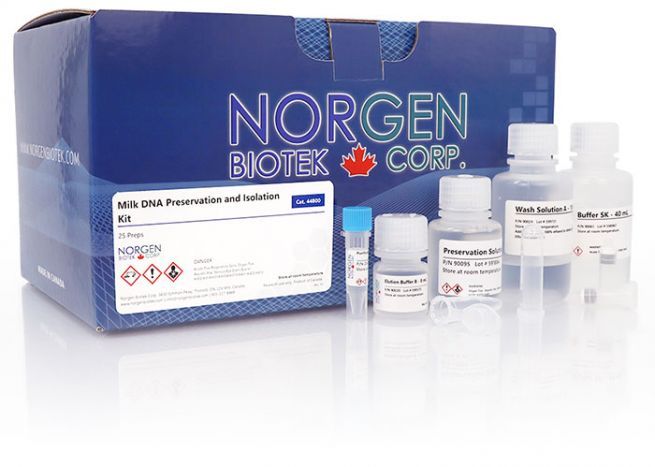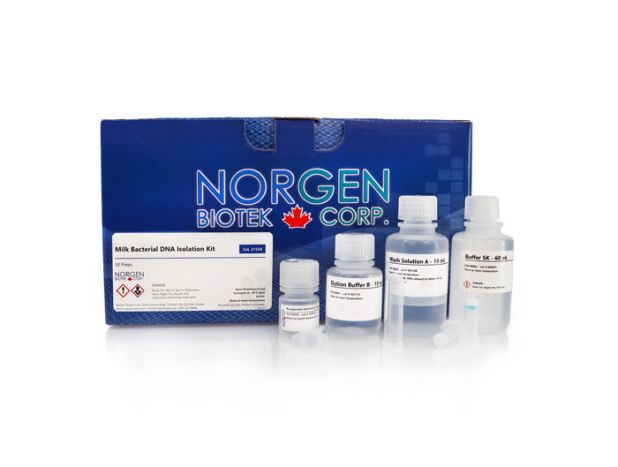Milk DNA Preservation and Isolation Kit

Milk DNA Preservation and Isolation Kit
Register today to receive an exclusive 15% off* on your first order.
Supporting Data
Figure 1. Isolation of DNA From Different Volumes of Preserved Milk (0.5 mL, 1 mL, 1.5 mL and 2 mL) Using Norgen’s Milk DNA Preservation and Isolation Kit. For evaluation, ten microlitres of the isolated 100 µL DNA was loaded on 1.2% agarose gel, and all DNA samples on the gel showed good integrity (A). The correlated DNA yield increase (B) with increasing preserved milk input volumes, along with the gel analysis, indicates that Norgen’s Milk DNA Preservation and Isolation Kit (Cat. 44800) was able to isolate milk DNA from up to 2 mL preserved milk. Lane M is Norgen's UltraRanger DNA Ladder (Cat. 12100).
Figure 2. Amplification of 16s rRNA Gene From Different Volumes of Preserved Milk. E.coli was spiked into the preserved milk and the DNA was then isolated using Norgen's Milk DNA Preservation and Isolation Kit (Cat. 44800). Two microlitres of the 100 µL isolated DNA were used in a 20 µL qPCR reaction using TaqMan 16s rRNA qPCR. No PCR inhibition was observed from all milk DNA isolated from the different preserved milk volumes (Pink: 0.5 mL, Blue: 1 mL, Red: 1.5 mL and Green: 2 mL), indicating the high quality of milk DNA.
|
Kit Specifications
|
|
|
Maximum Milk Input
|
0.5 mL
|
|
Time to Complete 10 Purifications
|
80 minutes
(20 minutes hands on) |
Storage Conditions and Product Stability
The Proteinase K should be stored at -20°C upon arrival and after reconstitution. All other solutions should be kept tightly sealed and stored at room temperature. This kit is stable for 2 years after the date of shipment.
Storage in Preservation Buffer
1) Storage at -20°C is recommended for archival samples and will provide optimal preservation. The preservation buffer will freeze at -20°C. Samples can be stored indefinitely at -70°C.
2) Samples can be stored at room temperature (25°C) for up to 1 month without significant loss of DNA quality.
3) DNA has also been successfully isolated from samples stored at 37°C 1 for one week.
| Kit Components | Cat. 44800 (25 preps) |
|---|---|
| Preservation Solution E | 30 mL |
| Proteinase K | 0.6 mL |
| Purification Additive | 0.5 mL |
| Buffer SK | 40 mL |
| Wash Solution A | 18 mL |
| Elution Buffer B | 8 mL |
| Mini Spin Columns | 25 |
| Collection Tubes | 25 |
| Elution Tubes (1.7 mL) | 25 |
| Product Insert | 1 |
Documentation
FAQs
Spin Column
Clogged columns may occur due to:
- Centrifugation speed was too low or spin time was inadequate.
Check the centrifuge to ensure that it is capable of generating the required RPMs. Sufficient centrifugal force is required to move the liquid phase through the resin. Also, ensure that the correct spin times are followed. Spinning for a few additional minutes will help.
- The sample is too large.
Too many cells were applied to the column. Ensure that no more than 1 mL of preserved milk is applied to the column. Clogging can be alleviated by centrifuging for a longer period of time until the lysate passes through the column.
- The lysate/Buffer SK mixture is not homogeneous.
To ensure a homogeneous solution, vortex for 10-15 seconds before applying the lysate to the spin column.
The yield of genomic DNA may be lower than expected due to the following:
- Incomplete lysis of cells.
Increased Proteinase K incubation time at 55ºC may result in increased yields.
- The DNA elution is incomplete.
Ensure that centrifugation at 14,000 x g is performed after the 200 x g centrifugation cycle to ensure that all the DNA is eluted.
- DNA concentration in the saliva sample being used is low.
Some milk samples contain very little DNA. This varies from individual to individual based on numerous variables. Increased Proteinase K incubation time at 55ºC may result in increased yields.
- Preservation Solution E was not added to the milk samples.
Preservation Solution E must be added to the milk samples even if they are not to be stored for long term.
DNA could be degraded due to preservation solution E not being completely mixed with the milk sample. Ensure Preservation Solution E was mixed well with the milk sample.
If the DNA does not perform well in downstream applications, it may be due to one or more of the following:
- DNA was not washed two times with the provided Wash Solution A.
Traces of salt from the binding step may remain in the sample if the column is not washed two times with the Wash Solution A. Salt may interfere with downstream applications, and thus must be washed from the column.
- Ethanol carryover.
Ensure that the dry spin under the Column Wash procedure is performed in order to remove traces of ethanol prior to elution. Ethanol is known to interfere with many downstream applications.
If RNA is present in eluted DNA, it's because RNA is coeluted with the DNA. Carry out a digestion with RNase A on the elution if the RNA present will interfere with downstream applications. Refer to the manufacturer’s instructions regarding the amount of enzyme to use, optimal incubation time, and temperature.

